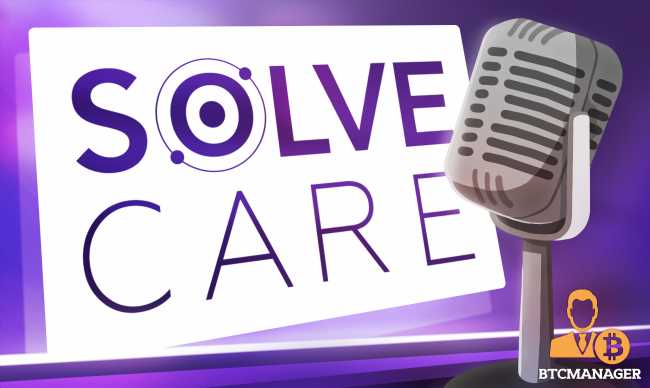Solve.Care has launched the Global Telehealth Exchange (GTHE), its co-founder, Pradeep Goel, has revealed in an exclusive interview on BTCManager‘s 1 Confirmation with Jeff and Dave.
Democratizing Healthcare, GTHE Breaking Barriers
The Ethereum-based platform uses information technology and features of the blockchain to better deliver, manage, and democratize healthcare.
It is a patient-centric solution, aiming specifically to connect patients with doctors permissionlessly without compromising their data security and contravening applicable, country-specific, and disparate regulations.
As part of their increasing product offerings, the GTHE is central to the whole, a solution that Pradeep describes as “their proudest achievements yet.”
GTHE is a blend of teleconsultation and in-person care, between which a global payment system will ease the connection between licensed medical practitioners and patients.
Even still, in this kind of blended care model, there is in-person care, online marriage, remote monitoring, and continuous data collection—controlled by the patient—not third parties, not even insurance companies.
According to Pradeep, this type of health care facilitated by technology and a proper payment channel is the future.
Global Expansion—Compliance is Key
Already, Solve.Care is available in over 20 countries. However, there are solid plans to expand to 41 countries by the end of the year.
They will begin operating in the other 21 countries in Latin America in the second phase. These countries were handpicked depending on their applicable laws.
Solve.Care will eventually launch in the last phase in the U.S., Middle East, and Africa.
In the meantime, Solve.Care has appointed ambassadors in different countries to teach medical practitioners how best to use the Solve.Care suite and GTHE.
Pradeep revealed that the objective is to ensure continuous signups while guaranteeing the dispensation of quality services to patients.
At present, the goal of Solve.Care is to provide service to as many people around the globe, leveraging technology. Even still, the pace of this growth faces headwinds, especially from a regulatory point of view.
Aforementioned, countries of interest may be receptive to technology like blockchain. However, their laws, especially those guiding healthcare and data, are convoluted.
Notably, laws guiding data—such as security, custody, residency, and ownership are challenging. This is not inclusive of problems around licensing and those revolving around Telehealth. This complication, combined with the newness of blockchain technology and the absence of guiding crypto laws in some countries, is bogging progress and rapid onboarding.
Nonetheless, where Solve.Care has found a root, their goal is to strike as many patient-doctor relationships as possible while systematically managing them while placing the SOLVE token central to their operations.
Their overarching goal of being a global Telehealth force allowed them to build a framework that will eventually make compliance smooth.
Solve.Care and GTHE is Promoting Global Accessibility to Healthcare
One way Solve.Care is trying to fast-track onboarding—and saving time from regulatory pressures—is by ensuring that clinically licensed doctors voluntarily sign up as individuals—without association or affiliation to any hospital or institution.
Once they are approved and their profile set up, they can be matched—using all the eligibility criteria that the doctor has supplied–with patients from across the globe using the SOLVE token for payment.
The rollout of the GTHE continues to open up healthcare, allowing everyone on either side of the divide to sign up, as patients or doctors.
At the same time, it highlights the importance of blockchain technology as a facilitating tool, central in powering a regulatory-agnostic payment channel using SOLVE and guaranteeing the security and privacy of patients’ data.
Privacy of patient data, especially those facing mental health challenges, is critical now during the Coronavirus pandemic, where it has had a profound effect on the younger demographic.
The automation brought by the GTHE, the privacy preservation that comes by default in Solve.Care, and the online accessibility of the platform have been encouraging more to consult online, connecting with approved mental health experts. Considering the impact of COVID-19 on health care and how Solve.Care is actively helping improve access, the team is now working with a suicide prevention network in India.
The merger of efficiency in service dispensation, patient data security, accessibility to quality healthcare, and patient priority is what differentiates Solve.Care from the rest.
In the future, where every approval will depend on the patient, Solve.Care and the GTHE plan to be central as the leading enabler, initiating the primary connection.
Related posts:
Source: Read Full Article
